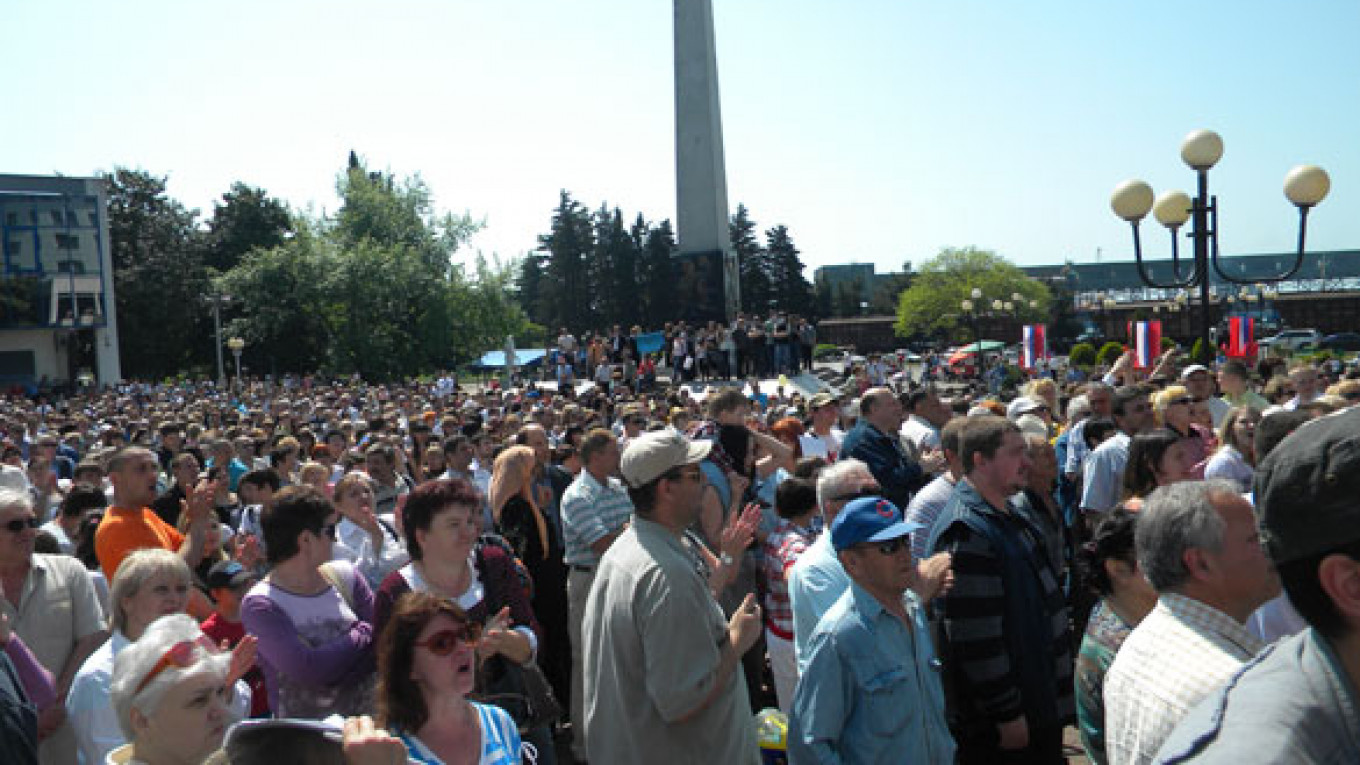A toxic fertilizer spill in Tuapse, Krasnodar region, has sparked unprecedented protests in the small seaside town, with locals venting their rage at development that they say is putting their lives and health in danger.
About 3,000 residents of Tuapse, located just 110 kilometers north of Sochi, which will host the 2014 Winter Olympic Games, rallied in protest on Saturday. They called for a fertilizer shipping terminal, owned by fertilizer giant EuroChem, to be shut down.
In March, a spill at the centrally located terminal, which is still not officially operational, blanketed the town in fertilizer dust, leading to a spike in respiratory problems throughout the town, locals said.
"Since the terminal is not ready for operation, the loading belt broke, and a large quantity of fertilizer fell, creating a cloud that quickly swept over the town," said Yelena Leonidova, who can see the terminal from her window.
People whose windows face the terminal saw workers dumping fertilizers from the ship into the water, which many cite as the cause of the dead fish and dolphins that washed up on shore in the following weeks, said Anna Tesheva, a biologist who lives about a kilometer from the terminal.
"Usually there are only three dolphins per year that are washed ashore dead, and most of the time they are physically damaged, but since the loading in March, nine dead animals have been found on the coast," she said.
The dolphins were quickly disposed of, and their cause of death was never made public.
"We are a small town, and everything is controlled," Tesheva said. "Although clinics were full of people with poisoning symptoms, they were all diagnosed with the common cold and allergies," she said.
"For two days I suffered from sharp headaches, a sore throat, and constant nausea and thirst," Leonidova said. "The stadium next to my house was covered with the fertilizer, making it look as though it had just hailed," she said. "People were afraid to go outside."
Since 1999, Tuapse has seen an explosion in the construction of various shipping terminals for loading grain, oil, sulphur and other commodities.
For Tuapse residents, the fertilizer spill was the last straw.
"People are at a boiling point now," said Yevgeny Vitishko, who heads the Tuapse environmental council. "The terminal is not ready, the transport belt gallery is not finished, the main warehouse is not finished. The terminal has not officially begun operation, and yet it is in operation," he said.
While the company has said the loadings in March were "test loadings," Vitishko said EuroChem, Russia's largest fertilizer producer, may have been filling orders that it had agreed to before the company began running behind on its construction schedule.
EuroChem began building the terminal, which can handle 2.3 million tons per year, in 2007 in order to cut transportation costs on its exports.
A woman who answered the phone at the Tuapse Bulk Terminal would not connect a reporter with anyone authorized to comment Tuesday. EuroChem spokesman Vladimir Torin could not be reached for comment. Viktor Koshel, head of the Tuapse district administration, was not available for comment either, his assistant said.
In an interview with news web site Yuga.ru last month, EuroChem logistics director Pavel Yakovlev denied all allegations regarding the spill. "Information about poisoning people is from the realm of fantasy. There couldn't have been any poisonings, since there was no accident in the first place, and there is not one proven record of our workers seeking medical attention due to some poisoning," he said.
Many in the community claim that four workers were hospitalized and eventually died after the spill, and others complain of continued nausea.
Protesters on Saturday also called for the town to be reclassified as a municipality, rather than a settlement. In 2007, the town held a referendum on a measure that changed the status of Tuapse, a town of 60,000 people, from a municipality to a settlement and merged it with the Tuapse district.
Since the district has limited oversight ability, the reclassification loosened regulation on the terminal, whose operations would have been more strictly followed by the city authorities, Vitishko said.
The 2007 referendum broadly supported the reclassification, but some say the results were falsified.
Sergei Rozhkov, a local journalist, who wrote about the vote rigging, was charged with assaulting police in February 2008 after six officers arrested him at his house one night, took him to the police department and beat him into a concussion. He was sentenced to three years in prison and was released only last week.
Rozhkov now stays away from protests, he said when contacted by phone Tuesday.
A Message from The Moscow Times:
Dear readers,
We are facing unprecedented challenges. Russia's Prosecutor General's Office has designated The Moscow Times as an "undesirable" organization, criminalizing our work and putting our staff at risk of prosecution. This follows our earlier unjust labeling as a "foreign agent."
These actions are direct attempts to silence independent journalism in Russia. The authorities claim our work "discredits the decisions of the Russian leadership." We see things differently: we strive to provide accurate, unbiased reporting on Russia.
We, the journalists of The Moscow Times, refuse to be silenced. But to continue our work, we need your help.
Your support, no matter how small, makes a world of difference. If you can, please support us monthly starting from just $2. It's quick to set up, and every contribution makes a significant impact.
By supporting The Moscow Times, you're defending open, independent journalism in the face of repression. Thank you for standing with us.
Remind me later.


